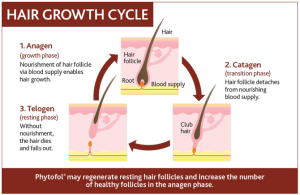People can spend a disproportionate amount of their personal grooming time and money on their hair. A high premium is placed on a full head of hair and balding or sudden loss of hair is often very distressing.
‘Alopecia’ is an umbrella term for hair loss. Alopecia may manifest in a number of different ways.
Common forms of alopecia include:
- Alopecia Areata – this is when sudden hair loss occurs in smooth, round patches about the size of a coin or larger. It can result in complete scalp hair loss and loss of some or all body hair
- Androgenic Alopecia – is more commonly called ‘male pattern baldness’ or ‘female pattern baldness’
- Telogen effluvium- this condition is often short-term and presents with diffuse scalp hair thinning. It may be associated with pregnancy, a serious illness with a high fever, abnormal thyroid function or low iron levels
The normal process for hair growth:
 Anagen – This is the active phase of hair growth via cellular division. This lasts usually between two and six years.
Anagen – This is the active phase of hair growth via cellular division. This lasts usually between two and six years.
Catagen – The resting stage, which lasts between two and three months.
Telogen – This is the stage in which hair has completed its growth and falls out.
It is normal to lose between 50 and 100 hairs a day. Although all hair on the body follows this process, hair on many parts of the body may have shorter anagen phases than others. For example, hair on arms and legs, eyebrows, and eyelashes all have short growth periods. Additionally, some hair on the head may have a shorter than normal anagen phase and leave the individual with the inability to grow long hair. These are not signs of alopecia. As people age, their rate of new hair growth diminishes, resulting in a gradual thinning.
Treatment
Different treatment options are offered, depending on the different type of hair loss involved. Some therapies slow the rate of the hair loss whilst others are able to trigger regrowth. A dermatologist can guide you through the various processes necessary to manage your variation of the condition.
If you have any questions or concerns about alopecia contact your local doctor, who will arrange for you to see a dermatologist. Contact us today.



